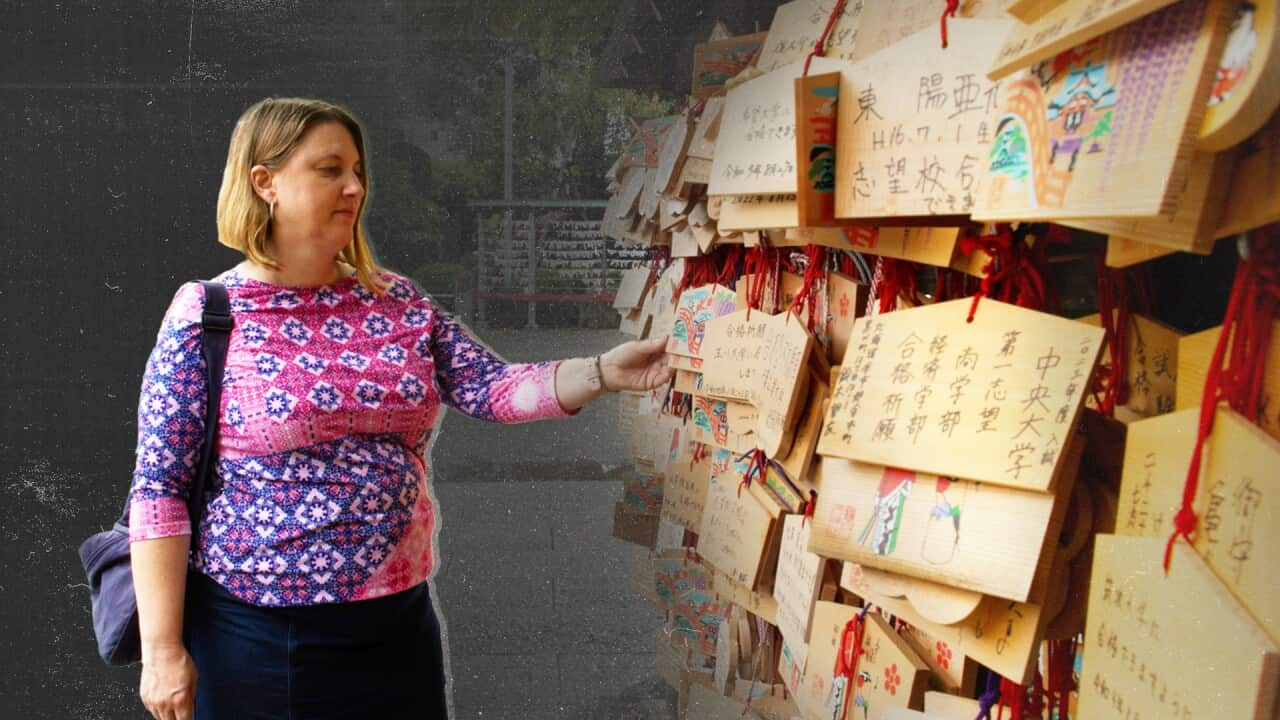Key Points
- Catherine Henderson says she hasn’t spoken with her two teenage children since they were abducted by their father
- The Australian mum was on her way home from work when her lawyer called.
Watch the documentary 'Japan's Taken Children' at 9.30pm Tuesday October 11, on SBS or stream via
Catherine Henderson was on a Tokyo train platform when she learnt she had lost her children.
The Australian mum was on her way home from work when her lawyer called.
She recalls her saying: “We've just received a fax from your husband's lawyer saying that he and the children have moved out.”
"I was just stunned,” Catherine said. “I was shocked. I couldn't believe what I was hearing. ‘What do you mean?'
“And she said: ‘well, he and the children have gone.’”
Catherine’s son and daughter were under 15 years old at the time.
When Catherine got home, she found her house almost empty of furniture, but for a few rugs on the floor.
Her then husband had moved out, taking the children and their possessions with him. The home had been normal when she had left for work that morning.

Catherine's home after her then husband moved out with their children.
“I don't doubt that he loves them, but I believe that this is a really harmful act.
“I haven't spoken to [my children] since the day before they were abducted.”
Japan's custody laws
The Department of Foreign Affairs and Trade has provided consular assistance to 82 children involved in parental abduction and child custody cases in Japan since 2004.
warns: “the abduction of a child by a parent may not be considered a criminal offence in Japan.”
The East Asian nation is one of the few countries in the world with a sole custody system.
In Japan, married parents share the parental rights of a child. But after divorce, only one parent, either the father or mother, can have parental rights.
When divorces in Japan are by mutual agreement, the separating couple agree on who takes the sole custody.
I couldn't believe that he would do something so obviously harmful to the children.Catherine Henderson
But in disputed cases, Japanese family courts nearly always grant sole custody to whoever has physical control of the children at the time.
In simple terms: If you have them, you get them.
Catherine says: “it's almost like you are the fool for not having abducted. It's basically a race to abduct.
“I didn't know about that. And I don't think I could have, but it's basically whoever abducts first wins.”
'Parental abduction'
Catherine’s lawyer, Tamayo Omura, agreed the system encourages parental abduction.
She said a child’s stable living environment is the major consideration when custody is decided.
So, if an abducting parent can prove a child had a stable life by keeping the other parent away, that parent can gain sole custody of the child. This, Ms Omura said, “encourages such action.”
“I feel strongly that the Japanese system doesn't serve children's welfare,” she said.

Catherine Henderson speaks to Dateline in Tokyo, Japan.
The lawyer is joint legal counsel in two class action lawsuits; Catherine is a star plaintiff in both.
They're suing the Japan government for failing to outlaw parental abduction, and for failing to have a proper child visitation process for non-custodial parents.
The current laws, they say, are unconstitutional.
A ruling on the visitation class action is expected in November, while the abduction case ruling is due in January 2023.
It's almost like you are the fool for not having abducted. It's basically a race to abduct.Catherine Henderson
While Catherine waits for the court rulings, she still can’t see her children.
She said: “A lot of Australians say to me, well, why don't you just go and get your kids? Why don't you just go and get them and bring them.
“And, and it's just not that simple.”
In 2019, on charges of trespassing when he went to his estranged in-laws' Tokyo apartment building to look for his children, whom he said he'd not seen for months.

Tamayo Omura is Catherine’s lawyer and joint legal counsel in two class action lawsuits against the Japanese government.
“I am fearful of the police,” she said.
"Because I'm not Japanese, I could get thrown out of the country and lose my right to live here and then I'd be even further away from the children.
“I've lost my home, the children, my job, everything's gone. And now I feel obligated to stay in Japan because my children are here.”
Catherine's ex-husband declined Dateline's invitation to be interviewed for this story.
In a written statement, he said: “The court ruled... I hadn't committed Parental Alienation, illegally removed the children or failed to cooperate with visitation.”


